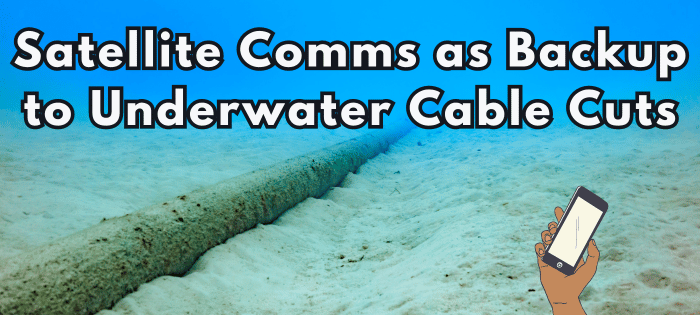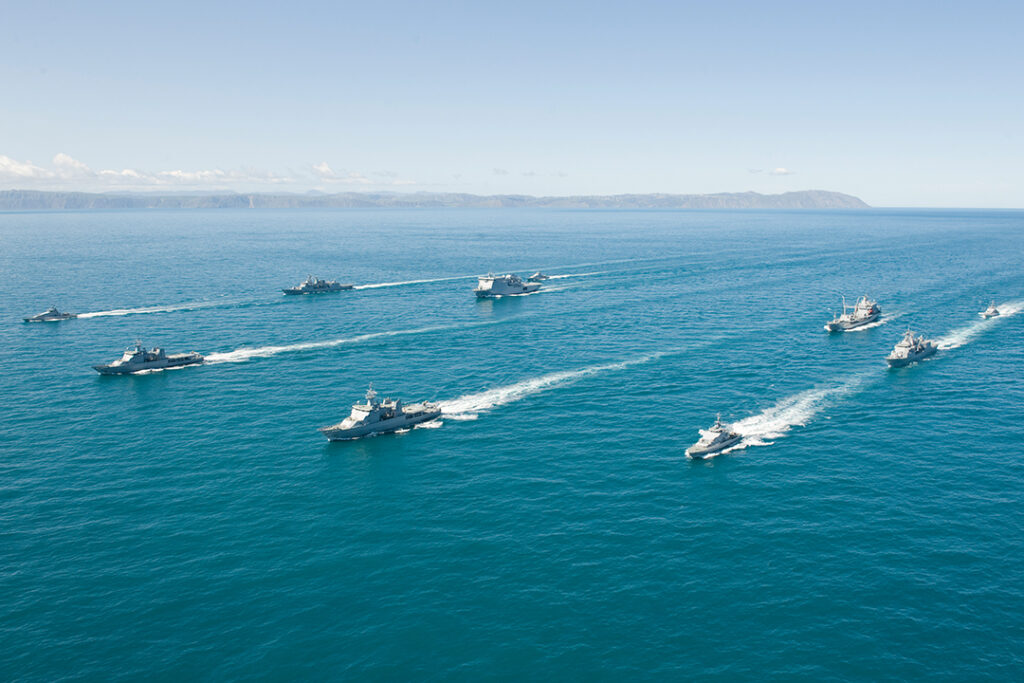Mar 5, 2024

The recent nationwide cell phone outage in the US, coupled with news of alleged attacks on undersea internet cables in the Red Sea, serve as stark reminders of our dependence on fragile terrestrial communication infrastructure. While these events may seem isolated, they paint a broader picture of a world increasingly vulnerable to communication disruptions.
In this ever-connected world, staying online is no longer a luxury; it's a necessity. Businesses rely on seamless communication for everything from daily operations to global collaboration. Individuals depend on it for safety, information access, and staying connected with loved ones. But what happens when the network goes down? The answer can be chaos, delays, and even financial losses.
Therefore, in light of recent events, it's crucial for businesses and individuals to consider backup communication solutions in the form of satellite connectivity. This blog post explores why several types of companies should seriously consider this investment.

1. Businesses Operating in High-Risk Areas:
Companies operating in geographically or politically volatile regions are particularly vulnerable to communication disruptions. These disruptions can stem from:
- Natural Disasters: Hurricanes, earthquakes, and other natural disasters can damage communication infrastructure, leaving entire regions offline.
- Political Unrest: Civil unrest, conflict, and deliberate sabotage can target communication networks, hindering business operations and impacting employee safety.
- Cyberattacks: Malicious actors are constantly targeting critical infrastructure, including communication networks. A successful attack can cripple communication for extended periods.
For businesses operating in such high-risk areas, satellite connectivity offers a reliable and secure communication channel, even when terrestrial networks are compromised. Satellite networks operate independently of ground infrastructure, ensuring uninterrupted communication regardless of local disruptions. This can be the difference between maintaining business continuity and facing significant setbacks.
2. Businesses Reliant on Real-Time Communication:
Some industries rely heavily on real-time communication for crucial operations. Examples include:
- Financial institutions: Stock trades, currency exchanges, and other financial transactions often require real-time data and communication. Outages can lead to missed opportunities, errors, and financial losses.
- Logistics and supply chain companies: Real-time tracking of goods, communication with drivers, and coordination across locations are vital for smooth operations. Disruptions can lead to delays, lost shipments, and frustrated customers.
- Emergency services: Firefighters, police officers, and other emergency personnel rely on reliable communication to coordinate responses and ensure public safety. Outages can hinder their ability to effectively respond to emergencies.
For these businesses, backup communication solutions like satellite phones or internet access are not just a good idea; they are a necessity. Satellite connectivity provides a reliable and independent communication channel, ensuring real-time information exchange even when terrestrial networks fail. This can be crucial for minimizing disruptions, ensuring efficient operations, and, in some cases, saving lives.
3. Businesses with Distributed Workforces:
The rise of remote work has led to a surge in companies with geographically dispersed teams. While this offers flexibility and cost-saving benefits, it also poses challenges in terms of communication. These challenges increase in scenarios where rural areas or regions with limited infrastructure are involved.
For businesses with distributed workforces, particularly those with employees in remote locations, satellite connectivity can be a game-changer. It ensures consistent and reliable communication, regardless of employees' physical location. This allows for seamless collaboration, efficient project management, and uninterrupted access to critical resources, even in areas with limited or unreliable terrestrial infrastructure.
4. Media and News Organizations:
In today's world, timely and accurate news reporting is crucial. However, traditional communication infrastructure can be vulnerable to disruptions during critical events, hindering the ability of media organizations to:
- Gather news and information: Outages can make it difficult for journalists to reach sources, gather information, and report on events unfolding in real-time.
- Broadcast and disseminate news: Disruptions can hinder the ability of media outlets to broadcast news reports, updates, and information to the public.
- Stay connected with audiences: In an age of constant information flow, outages can limit the ability of media organizations to connect and engage with their audiences.
For media and news organizations, satellite connectivity offers a vital backup solution. It allows them to continue gathering information, broadcasting news, and staying connected with their audiences even if terrestrial networks are compromised. This ensures the public remains informed about critical events during times of disruption.
5. Businesses with Critical Infrastructure Responsibilities:
Companies responsible for critical infrastructure, such as power grids, water supply systems, and communication networks, play a vital role in maintaining societal well-being. However, these entities are often highly reliant on the same communication infrastructure they are responsible for maintaining.
In the event of a large-scale outage, maintaining communication capabilities for these critical infrastructure providers becomes even more crucial. Satellite connectivity offers a reliable communication channel for these companies to:
- Coordinate repairs and restoration efforts: Efficient communication is vital for coordinating repair crews, managing resources, and restoring critical infrastructure functionality.
- Monitor and maintain systems: Even during outages, real-time monitoring of critical infrastructure is essential. Satellite connectivity allows companies to monitor system status and ensure public safety.
- Communicate with stakeholders: Clear and consistent communication with government agencies, emergency services, and the public is critical during outages. Satellite connectivity ensures the flow of important information and minimizes panic or confusion.
Beyond Business: Why Individuals Should Consider Satellite Communication
The benefits of satellite communication extend beyond the business world. Individuals, especially those who:
- Live in remote areas: For people living in rural locations or areas with limited or unreliable terrestrial infrastructure, satellite connectivity can be a lifeline. It provides access to essential services like telemedicine, remote education, and emergency communication.
- Travel frequently internationally: Travelers venturing into areas with unreliable communication networks can benefit from satellite communication for safety and peace of mind. It allows them to stay connected with loved ones back home and access emergency services if needed.
- Engage in outdoor activities: Hikers, campers, and adventurers who venture into remote areas can benefit from satellite communication for safety reasons. It allows them to send emergency alerts and connect with help if they get lost or encounter unexpected situations.
While traditional communication solutions are often sufficient in everyday life, in light of recent events and the ever-increasing risk of disruptions, investing in backup communication solutions like satellite connectivity offers a valuable sense of security and peace of mind. It ensures you can stay connected, informed, and in control, even in the face of unforeseen circumstances.
Making the Switch to Backup Communication Solutions
For companies and individuals considering satellite communication as a backup solution, several factors need to be considered:
- Needs assessment: Identify your specific communication needs and the level of redundancy required. This will help determine the type and capacity of a satellite solution needed.
- Equipment and service providers: Research different satellite communication service providers and compare their offerings. This includes factors like coverage area, pricing plans, equipment options, and customer support.
- Training and implementation: Ensure proper training for users on how to operate and utilize the satellite communication equipment effectively.
Conclusion
In today's interconnected world, reliable communication is no longer a luxury; it's a necessity. Recent events have highlighted the vulnerabilities of our terrestrial communication infrastructure. By incorporating backup communication solutions like satellite technology, businesses and individuals can ensure they remain connected and operational even in the face of disruption. This investment can offer significant benefits in terms of maintaining business continuity, ensuring personal safety, and staying informed during critical times.
Taking proactive steps to secure backup communication capabilities is no longer an option; it's a wise and potentially vital investment.
Recent Posts
- Built Like a Tank – The Starlink Performance Kit Arrives for Extreme Ops
- Old vs. New Starlink Terminals – What Buyers Need to Know
- Starlink High Performance Panel Installation Guide: A Complete Setup Tutorial
- Starlink Satellite Internet and Off-Grid Camping: The Ultimate Guide to Remote Wilderness Connectivity
- 6 Reasons to Consider a Satellite Phone After Hurricane Season 2024
- Hurricanes: A Harsh Reminder to Be Prepared
- 10 Solid Reasons to Consider EscapeZone's Faraday Protection Products
- Satellite Phone Store Offers Reliable Communication Amidst Nationwide Verizon Outage
- Protect Your Devices from the Unseen: Why You Should Invest in a Faraday Bag
- Finding the Best Satellite Phone for Your Needs: A Comprehensive Guide









































































